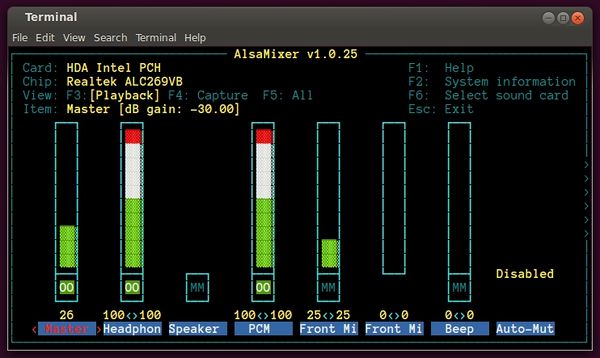Difference between revisions of "OE Audio Progs"
Kyoungmeyer (talk | contribs) (add more ALSA information) |
Kyoungmeyer (talk | contribs) |
||
| Line 8: | Line 8: | ||
::[[File:Alsamixer_screen.jpg|600px|thumb|left|Figure 1: Example of <code>alsamixer</code>]] | ::[[File:Alsamixer_screen.jpg|600px|thumb|left|Figure 1: Example of <code>alsamixer</code>]] | ||
<br clear=all> | <br clear=all> | ||
| − | * <code>alsactl</code> is used to control advanced settings for the ALSA soundcard drivers. It supports multiple soundcards. | + | * <code>alsactl</code> is used to control advanced settings for the ALSA soundcard drivers. It supports multiple soundcards. Also, the <code>alsactl store</code> command is used to store driver setup and changes made in <code>alsamixer</code> to the static configuration file. The following example demonstrates changing the settings for the default sound card: |
| + | <syntaxhighlight lang=bash> | ||
| + | root@emac-oe:~# alsamixer | ||
| + | #make necessary changes | ||
| + | ... | ||
| + | root@emac-oe:~# alsactl store | ||
| + | </syntaxhighlight> | ||
| + | :Aside from the store function, <code>alsactl</code> has a few other commands available. The <code>restore</code> command is used to load current driver setup for one or each soundcards from configuration file, the <code>init</code> command initialize driver and settings to a default state, and the <code>names</code> command dumps information about all the known present (sub-)devices into configuration file (<code>names</code> command is deprecated) | ||
* <code>aplay</code> is a command-line soundfile recorder for the ALSA soundcard driver. It supports several file formats and multiple soundcards with multiple devices. For supported soundfile formats, the sampling rate, bit depth, and so forth can be automatically determined from the soundfile header. | * <code>aplay</code> is a command-line soundfile recorder for the ALSA soundcard driver. It supports several file formats and multiple soundcards with multiple devices. For supported soundfile formats, the sampling rate, bit depth, and so forth can be automatically determined from the soundfile header. | ||
* <code>arecord</code> is a command-line soundfile recorder for the ALSA soundcard driver. It supports several file formats and multiple soundcards with multiple devices. If recording with interleaved mode samples the file is automatically split before the 2GB filesize. | * <code>arecord</code> is a command-line soundfile recorder for the ALSA soundcard driver. It supports several file formats and multiple soundcards with multiple devices. If recording with interleaved mode samples the file is automatically split before the 2GB filesize. | ||
Revision as of 17:30, 29 January 2014
ALSA
ALSA, or the Advanced Linux Sound Architecture, is a part of the Linux Kernel and is a software framework that provides an API for sound devices. The ALSA framework includes several applications for working with sound.
-
alsamixeris an ncurses mixer program for use with the ALSA soundcard drivers. It supports multiple soundcards with multiple devices. Thealsamixermenu displays a volume bar for each audio device present on the system. Adjusting these volume bars (with the arrow keys and 'm' for mute) allows changing of the output or input device volume corresponding to the given bar. An example of thealsamixerinterface is shown in Figure 1.
-
alsactlis used to control advanced settings for the ALSA soundcard drivers. It supports multiple soundcards. Also, thealsactl storecommand is used to store driver setup and changes made inalsamixerto the static configuration file. The following example demonstrates changing the settings for the default sound card:
root@emac-oe:~# alsamixer
#make necessary changes
...
root@emac-oe:~# alsactl store
- Aside from the store function,
alsactlhas a few other commands available. Therestorecommand is used to load current driver setup for one or each soundcards from configuration file, theinitcommand initialize driver and settings to a default state, and thenamescommand dumps information about all the known present (sub-)devices into configuration file (namescommand is deprecated)
-
aplayis a command-line soundfile recorder for the ALSA soundcard driver. It supports several file formats and multiple soundcards with multiple devices. For supported soundfile formats, the sampling rate, bit depth, and so forth can be automatically determined from the soundfile header. -
arecordis a command-line soundfile recorder for the ALSA soundcard driver. It supports several file formats and multiple soundcards with multiple devices. If recording with interleaved mode samples the file is automatically split before the 2GB filesize. -
speaker-testgenerates a series of sounds from the different channels of the default (or user specified) audio device. Some example tests include:
# Outputs a voice identifying each channel
root@emac-oe:~# speaker-test -t wav -l 1 -c 2
# Outputs a sine wave tone to each channel
root@emac-oe:~# speaker-test -t sine -l 1 -c 2 -f 550
mpg321
mpg321 is a simple and lightweight command line mp3 player. It is designed for use on front ends, shell scripts, as an mp3 player and as an mp3 to wave file decoder (primarily for use with CD-recording software).
Mplayer
Mplayer is a video player for Linux. It plays most common video and audio formats. Mplayer is provided for video support but is also used on headless systems for additional audio support.
